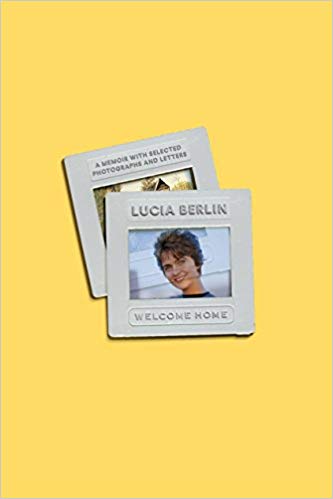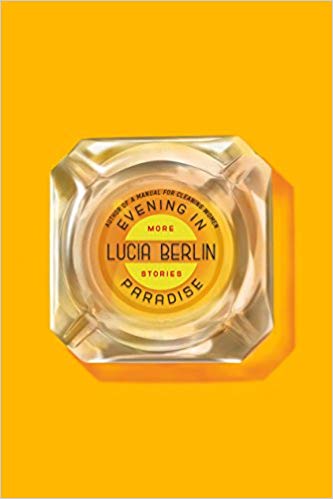Evening in Paradise and Welcome Home: Fiction by Lucia Berlin
Reviews
By David Mason
My introduction to Lucia Berlin came randomly—and forgettably—a long time ago. My high-school English teacher was constantly rattling on about writers’ perspectives and points of view, the lives they led off the page, as well as on. And she was in love with short stories. She’d bring in pages torn from magazines, coverless paperbacks, photocopies stapled together. Half leaning, half sitting on the corner of her desk, ankles crossed, she’d read them aloud in what she believed to be the authors’ voices. We’d sit there, apathetic, amused, or enthralled. Some combination of the three, really. I remember Mavis Gallant and Alice Munro. Mona Simpson’s “Lawns” won’t ever leave me, and Ray Carver’s “Boxes” sold me completely on short fiction. Lucia Berlin, though? Who?
Nearly thirty years later, I was gifted Berlin’s posthumous 2015 collection, A Manual for Cleaning Women, and it all came rushing back to me: the drunk, racist dentist, his granddaughter acting first as assistant, then as proxy, during a full extraction of his own teeth. So much blood plop-plop-plopping onto the tray where the little girl sits, straddling the line between accident and adventure. “Dr. H.A. Moynihan” is a hotwire to the memory of why I care about short stories at all. If A Manual for Cleaning Women is the definitive Berlin, two new books, taken together or individually, are necessary companions that offer deeper insight into who the author was, where she came from, and precisely what she could do.
Evening in Paradise is not for the delicate reader; these are stories that jar. Most of them are thinly veiled autobiographical pieces, populated by ne’er-do-wells, hope-they-do-wells, and try-but-just-can’t-figure-out-how-to-do-wells, and the women who want to be with them, want to be without them, and will one day have to bury them, one way or another. The longest—“Andado: A Gothic Romance”—tells the story of Laura, the fourteen-year-old daughter of an affluent American mining engineer, who spends a barely chaperoned holiday at a Chilean fundo owned by one of the wealthiest men in the country. The charming and much older man seduces the young girl, and she is left to question her worth to her disaffected and unavailable parents, her aloof and flighty friends, and ultimately herself. “The Musical Vanity Boxes” follows the exploits of a towheaded, seven-year-old gringa, Lucha, and her stormy-tempered Syrian friend, Hope, as they run an inadvertent grift through the streets of El Paso and Juarez, experiencing disappointment and the ugly truth of racial divides along the way. “Sometimes in Summer” revisits Lucha and Hope’s El Paso during a flood that “carried away chickens and cars,” where a chance encounter with a relative teaches Lucha that the ties that bind can also bind you down, without your ever knowing how. While there are strong arguments to be made for “La Barca de la Ilusion” and the titular “Evening in Paradise,” “Lead Street, Albuquerque” stands out as the best among the twenty-two stories collected here. Set at a New Mexico college, it’s about a group of art students whose lives tenuously orbit the brightest of them all, a sculptor named Rex. To avoid being drafted during the Korean War, Rex takes a wife, Maria (“She’s seventeen. American, but grew up in South America, acts foreign, shy.”), and summarily gets her pregnant. During the pregnancy Rex tries to mold her into something more appealing to him—like a piece of art, to be placed just so, occasionally admired, but most times ignored. After the baby comes, Rex pulls further away, unable to sculpt his family in such a way as to fit his life, finally leaving Maria on her own to make sense of things.
 Welcome Home: A Memoir with Selected Photographs is composed of vivid recollections of the places Berlin lived throughout her life. Geographically speaking, her life was itinerant and transient, moving from Alaska to Oakland to South America, and hitting several points in between. There were elegant-but-sad homes: in Santiago, Chile, young Lucia ate by herself, ringing a bell for each course, while her father dined out and her mother took meals in bed, drinking behind closed doors. There were simple-but-happy homes: in Patagonia, Arizona, her parents lived in a colorful and open house, their first proper home. There were others as well: Mexico, New York, New Mexico. Elvis Costello, with whom Berlin shares a certain mordant wit, famously sang, “Home isn’t where it used to be; home is anywhere you hang your head.” Through living in eighteen homes total, she learned this in spades.
Welcome Home: A Memoir with Selected Photographs is composed of vivid recollections of the places Berlin lived throughout her life. Geographically speaking, her life was itinerant and transient, moving from Alaska to Oakland to South America, and hitting several points in between. There were elegant-but-sad homes: in Santiago, Chile, young Lucia ate by herself, ringing a bell for each course, while her father dined out and her mother took meals in bed, drinking behind closed doors. There were simple-but-happy homes: in Patagonia, Arizona, her parents lived in a colorful and open house, their first proper home. There were others as well: Mexico, New York, New Mexico. Elvis Costello, with whom Berlin shares a certain mordant wit, famously sang, “Home isn’t where it used to be; home is anywhere you hang your head.” Through living in eighteen homes total, she learned this in spades.
In the memoir, though, where you really find Lucia Berlin, the Writer, is in her letters. The language is always plainspoken—but never pedestrian. Mostly written to her mentor, the Black Mountain poet Ed Dorn, the letters are reminiscent of the jazz that plays in the background of her stories: staccato, bouncing, urgent. She covers ground like a fat house cat, soft-footedly but unpredictably: the joys of motherhood and the fears that came along with it; feelings of insecurity about her craft; the difficulties of writing and the elation found in it; naïve denials of her husband’s drug abuse and of her own drinking; halfhearted thanks for criticism and tiny digs at her more successful friends. Time and again, she writes that she’s okay, even when it’s clear she’s not.
I gobbled up A Manual for Cleaning Women, which was too long, I think, and better suited to being read in short bursts. I was left with the feeling that I’d read the best of this largely unremembered author’s work (I was wrong), and that I’d read it badly, the glut of words leaving no room for an actual impression. I knew her writing was important, but I couldn’t have told you why. After reading Evening in Paradise and Welcome Home, I think I understand: Lucia told the truth well, whether she was telling the truth or not.
More Reviews



